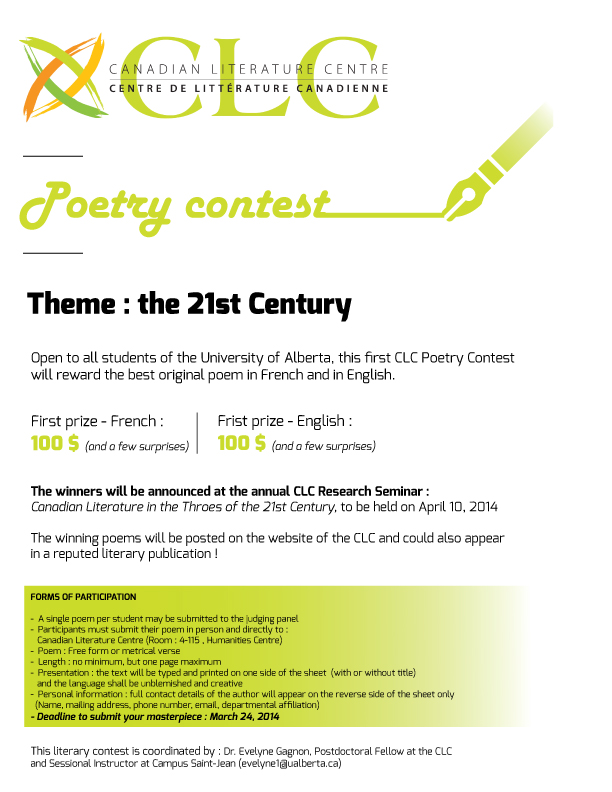Poetry Contest / Concours de poésie
2025 CLC Poetry Contest: "Polyphony" /
2025 Concours de poésie du CLC: « La polyphonie »
This annual contest is looking for the best poem written primarily in English and/or French by a student attending the University of Alberta, MacEwan University, Athabasca University, or NAIT.
This year’s theme is “Polyphony.”
The first place winner will receive $400 + a gift bag, and second place will receive $200. The deadline for submissions is February 18, 2025. A jury panel from the participating universities will select the winners, who will be announced in April 2025.
Please read and follow the instructions for submission carefully.
Terms:
- One unpublished poem per student, on the theme of “Polyphony.”
- The poem can be one page in length maximum; poems longer than a page will be disqualified.
- Email your poem in .doc, .docx, or PDF format, with no identifying information on the document, to clccomm@ualberta.ca with the subject line [Your Last Name]: CLC Poetry Contest.
- Include your name, university email, and departmental and university affiliation in the body of the email only.
You can read and listen to poems from past contest winners by scrolling down this webpage.
Ce Concours de poésie a en effet lieu chaque année et vise à célébrer les poètes edmontoniens et edmontoniennes. Ce concours est ouvert à toutes les étudiantes et à tous les étudiants de l’Université de l’Alberta, de l’Université MacEwan, de l’Université Athabasca, et de NAIT.
Le thème de cette année est « la polyphonie »
Premier Prix : 400 $ | Deuxième Prix : 200 $
Date limite pour envoyer les soumissions : Le 18 février 2025.
Les poèmes gagnants seront sélectionnés par un jury de professionnels affiliés aux institutions participantes. Les gagnant.e.s seront annoncé.e.s en avril 2025.
Modalités de participation :
- Un seul poème par étudiant(e) sur le thème de « la polyphonie », d’une longueur maximale d’une page, doit être soumis en format .doc, .docx ou PDF.
- Veuillez noter qu’aucune information identifiant le ou la poète ne doit apparaître sur le document contenant le poème.
- Dans le corps du courriel accompagnant votre soumission, veuillez inclure :
- Votre nom
- Votre adresse courriel
- Votre institution d’enseignement postsecondaire ou votre affiliation départementale et universitaire.
- Les soumissions doivent être envoyées par courriel à l’adresse suivante : clccomm@ualberta.ca.
- L’objet de votre message doit respecter le format suivant : « Nom de famille : Concours de poésie ».
Vous pouvez voir les poèmes des anciens gagnants ci-dessous.


Congratulations to the winners of the 2024 CLC Poetry Contest! /
Félicitations aux gagnants du Concours de poésie du CLC 2024 !
The CLC--along with NAIT, MacEwan University, and Athabasca University--congratulate Justine Schultz, Acacia Kubanay, and Joseph Lam for their winning poems!
Read the winning poems below and get to know a little bit about the poets.
Thank you to this year's contest judges--Dr. Evelyne Gagnon (Athabasca), Dr. Michael O'Driscoll (University of Alberta), and Kelly Shepherd (NAIT)--whose comments about each poem we share below. Thank you to all the students who submitted poems this year, as well as to our contest partners: Athabasca University, MacEwan University, NAIT, Edmonton Poetry Festival, Athabasca University Press, NeWest Press, University of Alberta Press, and SpokenWeb.
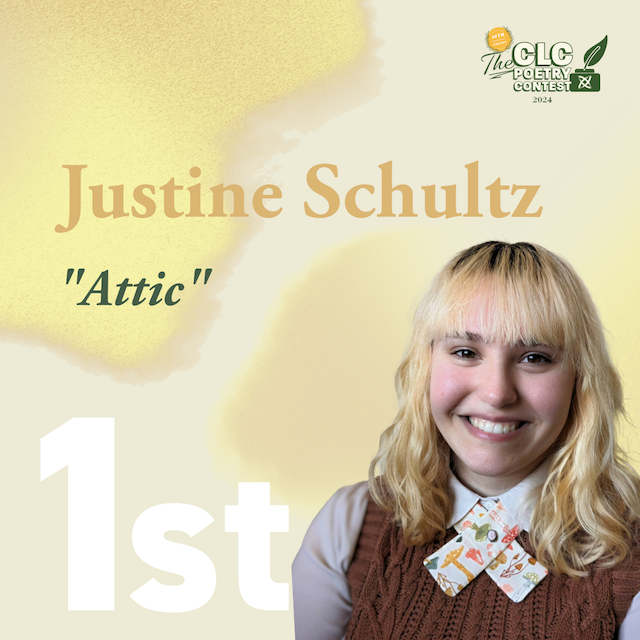
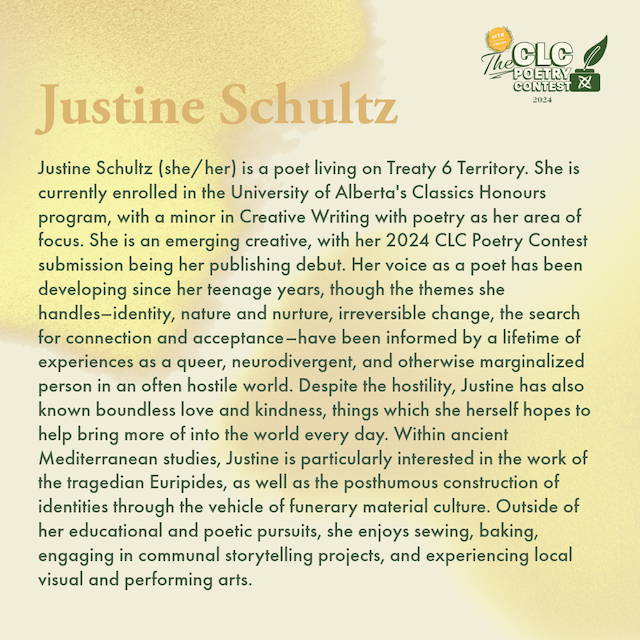
Read The Gateway's interview with Justine where she talks about writing "Attic."
Justine Schultz (she/her) is a poet living on Treaty 6 Territory. She is currently enrolled in the University of Alberta's Classics Honours program, with a minor in Creative Writing with poetry as her area of focus. She is an emerging creative, with her 2024 CLC Poetry Contest submission being her publishing debut. Her voice as a poet has been developing since her teenage years, though the themes she handles–identity, nature and nurture, irreversible change, the search for connection and acceptance–have been informed by a lifetime of experiences as a queer, neurodivergent, and otherwise marginalized person in an often hostile world. Despite the hostility, Justine has also known boundless love and kindness, things which she herself hopes to help bring more of into the world every day. Within ancient Mediterranean studies, Justine is particularly interested in the work of the tragedian Euripides, as well as the posthumous construction of identities through the vehicle of funerary material culture. Outside of her educational and poetic pursuits, she enjoys sewing, baking, engaging in communal storytelling projects, and experiencing local visual and performing arts.
The jury commented: "The poem 'Attic,' by Justine Schultz, is a moving account of father-daughter relationships captured in contrasting metaphors of fire and air. Stark symmetry and deftly chosen images provide an intimate account of the passions--anger, resentment, melancholy, loneliness--we store away and that give shape to our lives."
Attic
When other women
Speak of their fathers,
I can smell the soot-stain fingerprints
That mark their souls,
Their kindling hearts inherited
Just to burn and burn and burn,
The attics of their childhood homes stocked,
Like hoarder’s houses or doomsday bunkers,
With napalm and gasoline
Always just a spark away
From going up in flames
And these women
Born with flint in hand,
They may never have unpacked
Those boxes in the attic,
But they’ve kept them this long
My father
Was no volcano, no roaring bonfire of a man
He was more of a cave
And when the wind blew through him,
It would howl in lamentation as it passed,
Bird-bone-wind-chime skeleton
Kept propped up
With nothing but air
And the hand-me-down heart I was given
Hangs off my shoulders, heavy,
But ragged and moth-eaten
It struggles to keep me warm
And when the wind passes through its holes,
Through the hollow of my chest,
I think of my attic,
Empty
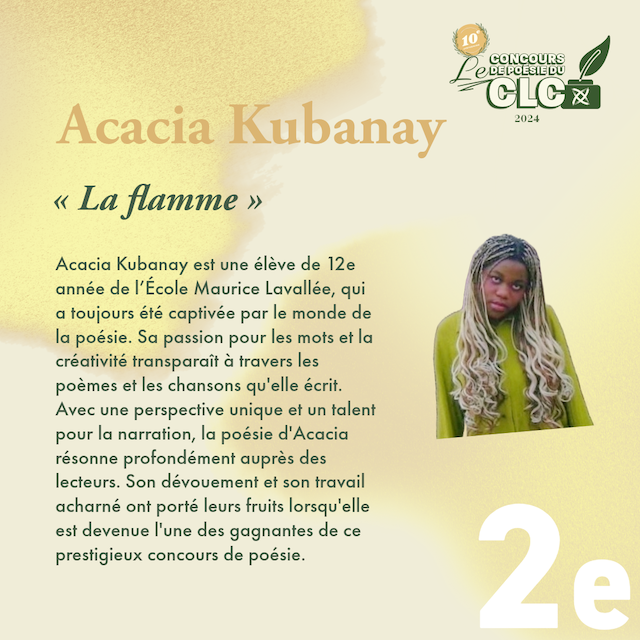
Acacia Kubanay est une élève de 12e année de l’École Maurice Lavallée, qui a toujours été captivée par le monde de la poésie. Sa passion pour les mots et la créativité transparaît à travers les poèmes et les chansons qu'elle écrit. Avec une perspective unique et un talent pour la narration, la poésie d'Acacia résonne profondément auprès des lecteurs. Son dévouement et son travail acharné ont porté leurs fruits lorsqu'elle est devenue l'une des gagnantes de ce prestigieux concours de poésie.
Les juges ont commenté: « Le poème ‘La flamme’ présente une harmonie et une élégance formelles qui témoignent d’habiletés poétiques notables. Le jury a particulièrement apprécié les riches jeux sonores et la construction cohésive des images exprimant l’agentivité du sujet poétique, qui célèbre avec détermination sa présence au monde. On nous rappelle avec justesse, dans ce poème, que la possibilité d’être vu.e, aimé.e, accepté.e (que ce soit par un proche ou encore par une collectivité), dans notre unicité même, demeure ce qui donne souffle à notre âme et ce qui, ultimement, nourrit notre flamme intérieure. »
La flamme
J’ai une flamme en moi que j’essaye toujours de cacher
Elle attire les regards des autres, mais ils n’osent jamais me toucher.
La seule façon dont je peux montrer mon amour, c’est en respirant
Mais quand je le fais, ils soufflent sur moi en disant
“Je ne sais pas comment t’aimer.”
J’ai une flamme en moi que je ne vais plus cacher
Car, elle brûle de désir et danse en silence,
Elle est un feu à nourrir, et ne cherchera plus de l’ombre pour l’accueillir
Malgré les vents contraires, elle ne va jamais faiblir
Car cette flamme est qui je suis
Moi et ma peau bronzée,
Mes yeux noirs et mon cœur sanglé
Je suis faite pour brûler, et non pour être diluée.
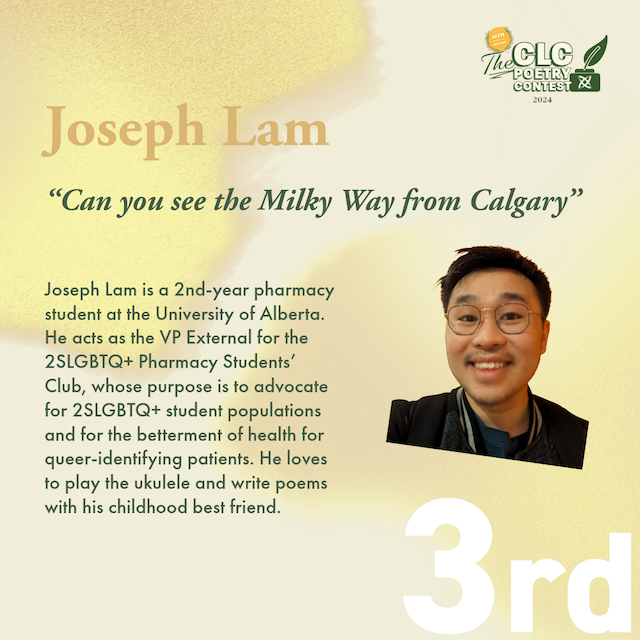
Joseph Lam is a 2nd-year pharmacy student at the University of Alberta. He acts as the VP External for the 2SLGBTQ+ Pharmacy Students’ Club, whose purpose is to advocate for 2SLGBTQ+ student populations and for the betterment of health for queer-identifying patients. He loves to play the ukulele and write poems with his childhood best friend.
The jury commented: “‘Can you see the Milky Way from Calgary’ by Joseph Lam is both deeply confessional and urgently political. The irregular stanzas, which juxtapose historical and international events and intimate, personal memories, are connected to one another but still surprising. The committee remarked on the poem's visceral, sensuous imagery, and the circularity of beginning and ending in the stars.”
Read Joseph's poem below and listen to him give a reading!
Can you see the Milky Way from Calgary
my mother points to Orion’s belt on the page of a beat-up library book,
said at 6 years old,
that stars can have names too,
rooted all that nerve into a
would-be wishing bone sleeping in my mother’s fingertips
i wake up in haunted houses now,
with chairs and moonbeams and whatever god uses
to keep her stomach in when
children are stolen and beaten in her name
I haven’t yet done ritual,
but I’ve seen fire
and smoke
Gaza burns, and our leaders are silent
I spent Thursday night liking a dead man’s message
Friday morning,
wondering if I’d know how to tourniquet a broken arm,
would know how to string my backbone tight enough
to un-blue a child’s face,
wonder if it would take god twice as long
I grew up Protestant,
but my better half would say I’m just gay and Chinese,
which means revolution is half-here, and
half dreaming of the first heel at Stonewall,
of my mother’s first breath on Canadian soil
but I know ancestors don’t stay in the ground,
have seen my father’s footsteps light a grave
from Vietnam to Alberta,
Asked me, “What do you know about silence?”
Silence loads itself into grief’s chambers,
takes aim at the biggest parts of ourselves
So small,
is everything my best friend swears she cannot be
the first time she ever held her nieces
But tonight, I am a child,
corporeal under these sheets,
wondering in all the silence,
if people can see the milky way from Calgary
2024 CLC Poetry Contest: "Air and Fire"/« L'air et le feu »
It's the CLC Poetry Contest's 10th anniversary!
This annual contest is looking for the best poem in English or French from a student attending the University of Alberta, MacEwan University, NAIT, Athabasca University, or participating French-language high schools.
This year’s theme is “Air and Fire.”
To celebrate our 10th anniversary, there will be a first, second, and third place winner, with one guaranteed French poem winner. First place will receive $500 + a gift bag, second place will receive $250, and third place will receive $150. The deadline for submissions is March 11, 2024. A jury panel from the participating universities will select the winners, who will be announced in April 2024.
Please read and follow the instructions for submission carefully. We look forward to reading your poem!
Terms:
- One poem, unpublished and maximum one page, per student
- Email the poem in .doc, .docx, or PDF format with no identifying information on the document to clccomm@ualberta.ca with the subject line [Your Last Name]: CLC Poetry Contest
- Include your name, email, and departmental and University affiliation in the body of the email only
Le Concours de poésie du CLC célèbre son 10e anniversaire !
Ce Concours de poésie a en effet lieu chaque année et vise à célébrer les poètes edmontoniens et edmontoniennes. Nous sommes donc à la recherche du meilleur poème, en anglais et en français, qui nous sera soumis par un.e étudiant.e de l’Université de l’Alberta, de l’Université MacEwan, de NAIT, de l’Université Athabasca ou encore des écoles secondaires francophones participantes.
Le thème de cette année est « L’air et le feu ».
Afin de célébrer ce 10e anniversaire, nous offrirons cette année un « Premier prix » de 500 $ (avec quelques surprises), un prix en « Seconde place » de 250 $ ainsi qu’un prix en « Troisième place » de 150 $. Veuillez noter qu’au moins un de ces prix sera alloué à un poème rédigé en français. Les poèmes gagnants seront sélectionnés par un jury de professionnels affiliés aux institutions participantes. La date limite pour soumettre les poèmes est le 11 mars 2024. Les gagnant.e.s seront annoncé.e.s en avril 2024.
Nous vous prions par ailleurs de consulter et suivre attentivement les modalités de soumission. C’est avec le plus grand enthousiasme que nous lirons vos poèmes, alors à vos crayons !
Modalités de participation :
- Un seul poème par étudiant.e, d’une longueur maximum d’une page, soumis en format .doc, .docx ou PDF. Veuillez noter qu’aucune information identifiant le ou la poète ne doivent figurer sur le document comprenant le poème soumis.
- Dans le corps du message accompagnant votre soumission par courriel : Veuillez inclure votre nom, adresse courriel, institution d’enseignement secondaire ou affiliation départementale et universitaire.
- Les participant.e.s des écoles secondaires francophones feront leur soumission par l’intermédiaire d’un.e professeur.e qui se chargera de faire parvenir le tout au CLC à partir de leur courriel institutionnel.
- Les soumissions doivent être envoyées par courriel à l’adresse suivante : clccomm@ualberta.ca
- L’objet de votre message prendra la forme suivante : « Nom de famille : Concours de poésie »
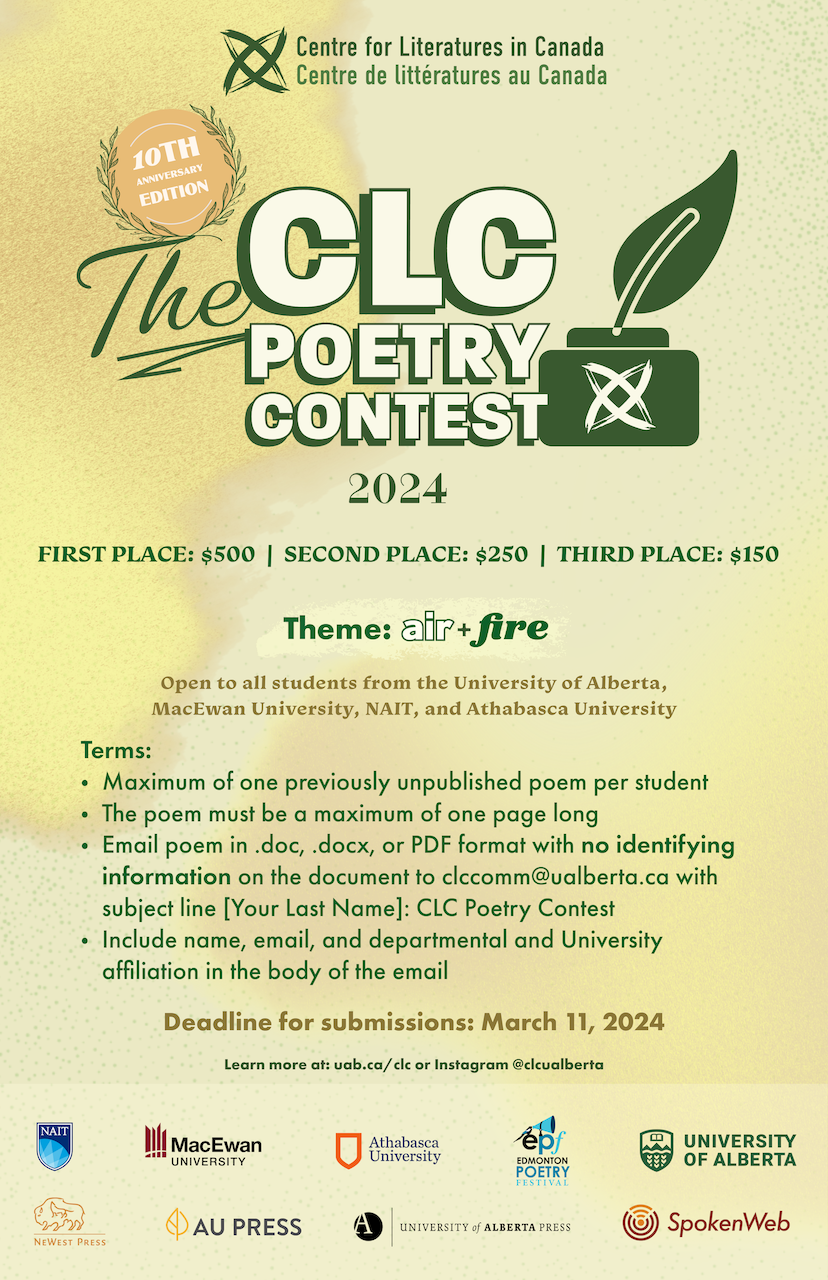
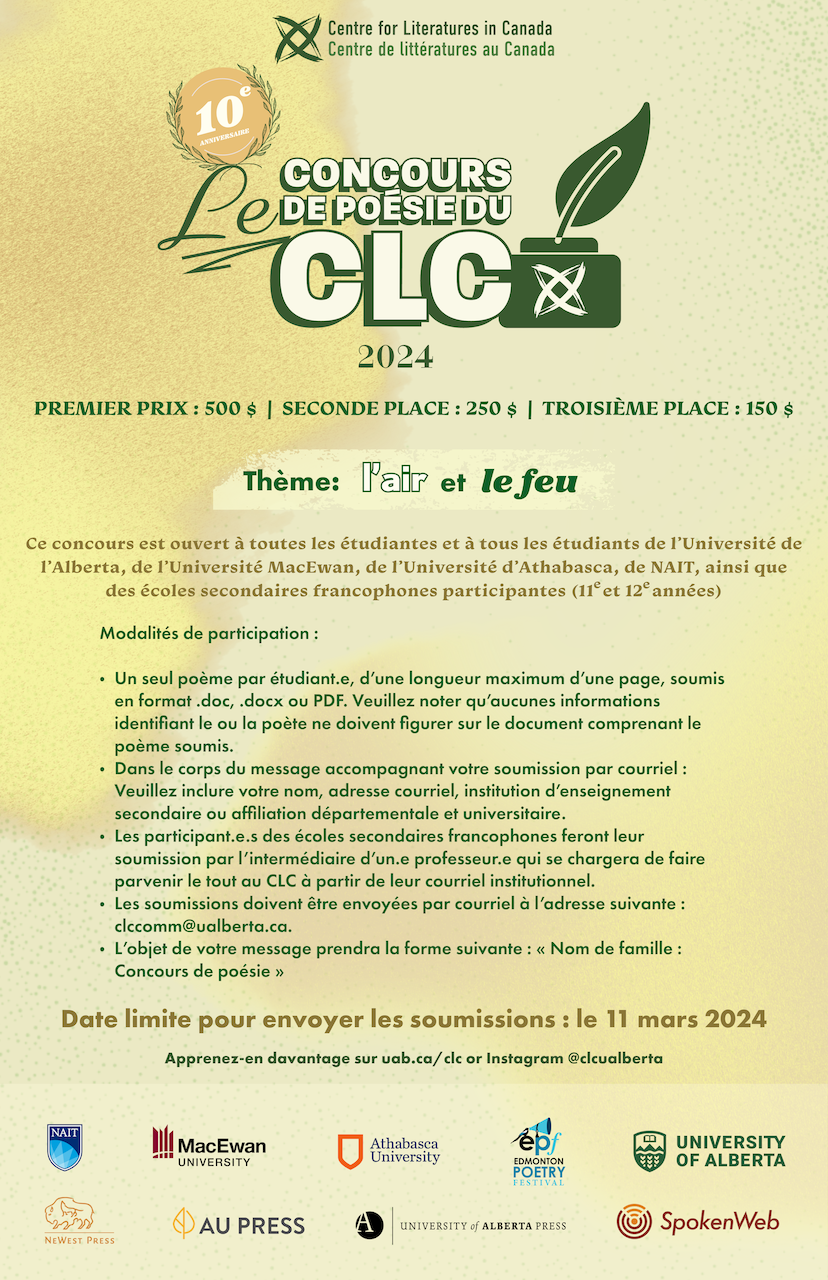
2023 CLC Poetry Contest Winner
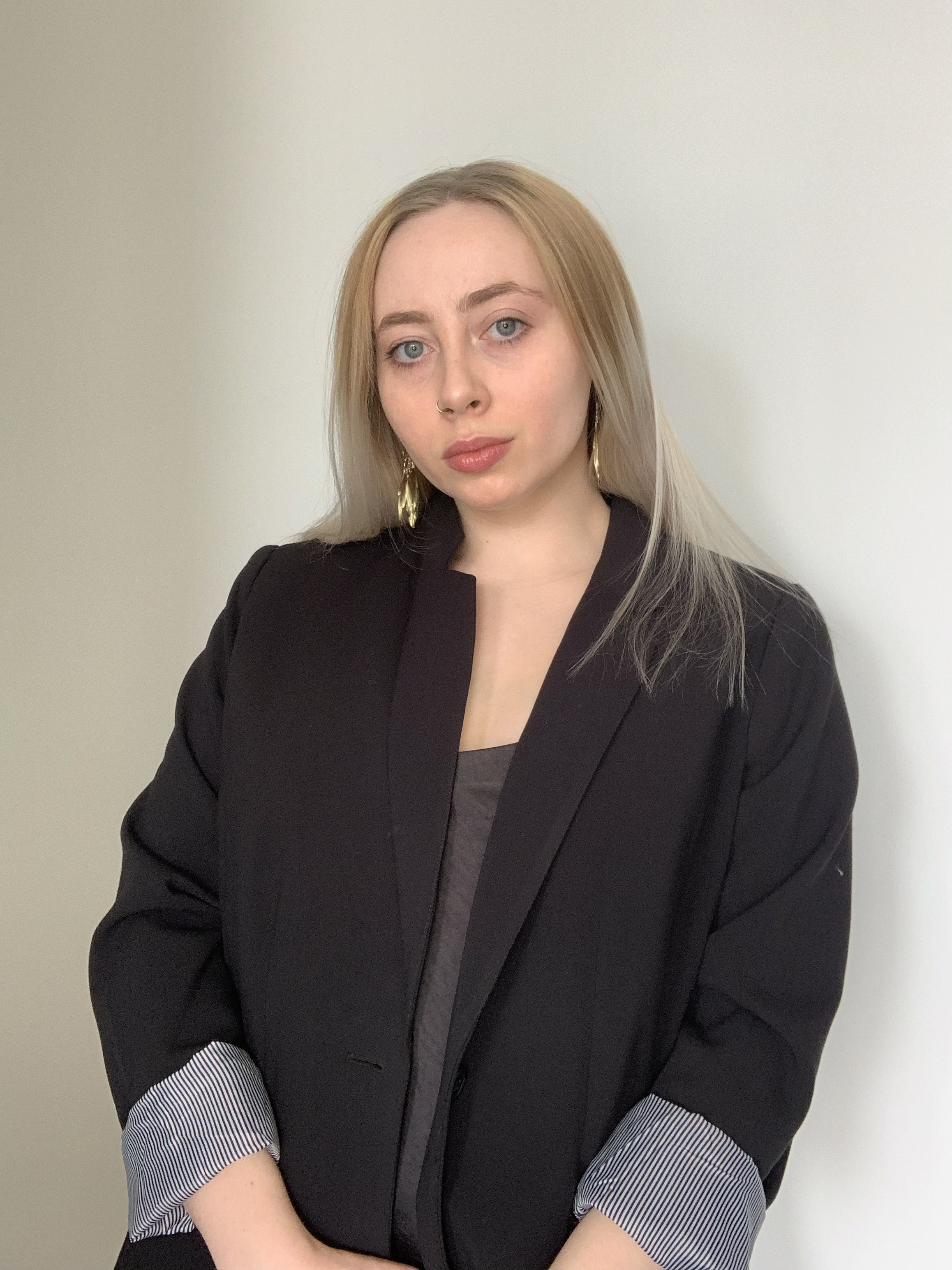
The CLC, MacEwan University, and Athabasca University extend our heartfelt congratulations to Abbigail Ketsa, whose poem “(Rural*) Grandmother Alchemy” was selected as the winner of the 2023 CLC Poetry Contest!
Abbigail Ketsa (she/they) is an emerging settler poet and writer from Edmonton, Alberta. She is finishing a Bachelor of Arts degree at the University of Alberta. A member of the LGBTQ+ community, they enjoy exploring death, existence, and the universe through poetry. Abbigail is currently participating in the 2023 Roger S. Smith Undergraduate Researcher Award, researching divine monstrosities and “vampires” in ancient Greek magic and religion. They are a recipient of the 2021 Ted and Charlotte Davenport Poetry Prize and the 2021 Darren Zenko Memorial Prize for the non-fiction essay “Step Into the Night,” a feminist telling of a night walk. They have previously worked on poetry’s function as a pedagogy of walking the city. Their prose work on poetry as a medium of exchange for the Italian-Canadian and diaspora experiences, "Cultural Literary Landscapes," is expected to be published in a 2023 Special Issue of Crossings: An Undergraduate Arts Journal. In her free time, she writes and shares short stories amongst peers and family. Abbigail hopes to forever be a work-in-progress and to share her experiences, strengths, and hope.
Read the winning poem below and listen to Abbigail give a reading!
The contest judges, Professors Marla Epp (MacEwan), Jocelyne Le Ber (Athabasca), and Michael O'Driscoll (University of Alberta) wrote: “The poem '(Rural*) Grandmother Alchemy' is a wonderfully evocative and challenging poem that captures this year's theme of ‘Land and Water’ by evoking generations of living close to the land 'as the night suckles the wheat / sprouts fingertips in hungry mouths.' The language snaps and cracks like the sidewalks, produce, and hands it describes, as the poem descends into starkly beautiful and disturbing imagery. The use of word variants, marked by asterisks and set in parentheses, invite multiple and complex readings of the poem as dynamic as the cycles of life it describes.”
Thank you to all who submitted to the contest this year, as well as to our partners: MacEwan University, Athabasca University, Edmonton Poetry Festival, University of Alberta Press, NeWest Press, and Athabasca University Press.
(Rural*) Grandmother Alchemy
the Past,
quack grass, grown-up
through the sidewalk
cracks, coarse as
Nana’s beans
left too long on the vine
cracks, fissuring the palm
from years of dirt toiling in the fields passed Chipman
dusty disdain for old women who fled
Hunger for new-world hate
where daughters inherit heirloom pain (hunger*) &
Suns scorch like angry men
(brittle*) …
sewing flax into cotton &
swallowing fresh-water pearls pulled
from the East* (Grand mother-of-pearl* / milk* / milking*)
violet blooms under eyes —
heart’s delight &
the leathered hands roll up like holubsti
from making bread in a stolen bread-basket (burning* / oven* / baking*)
as the night suckles the wheat
sprouts fingertips in hungry mouths
(warm and green*)
Grandmother’s love
splintering the playground
forgotten in the backfield (schoolyard*)
where we learn to feed mice to cats &
cats to coyotes &
writhing in the jaws and
watering the garden bloody
before our last harvest;
beige libation (oblation*)
turned (spun*)
Gold at twilight
2023 CLC Poetry Contest: "Land and Water"/« La terre et l'eau »
The Canadian Literature Centre, MacEwan University, and Athabasca University are once again teaming up to bring you the 2023 CLC Poetry Contest! We’re looking for the best poem in English or in French from a University of Alberta, MacEwan University, or Athabasca University student on the theme of “Land and Water.”
Entrants should submit their poem in .doc, .docx, or .pdf format, without any identifying information in the document, to clccomm@ualberta.ca by March 13, 2023. Please include name, email address, phone number, mailing address, and departmental and university affiliation in the body of the email, and use the subject line: “Last Name: CLC Poetry Contest."
Le Centre de littérature canadienne de l’Université de l’Alberta (CLC), en collaboration avec l’Université MacEwan et l’Université Athabasca, vous invite à participer à son Concours de poésie 2023. Nous sommes à la recherche du meilleur poème en français ou en anglais écrit par un étudiant ou une étudiante de l’une des trois institutions, qui porte sur le thème « La terre et l'eau. »
Chaque participant devra soumettre leur poème dans un seul fichier anonymisé de format .doc, .docx ou .pdf et l’envoyer à clccomm@ualberta.ca au plus tard le 13 mars 2023. Veuillez inclure votre nom, courriel, numéro de téléphone, adresse postale et affiliation départementale ou universitaire dans votre courriel, puis utilisez la formule suivante dans le sujet du message : « VOTRE NOM DE FAMILLE: Concours de poésie du CLC. »
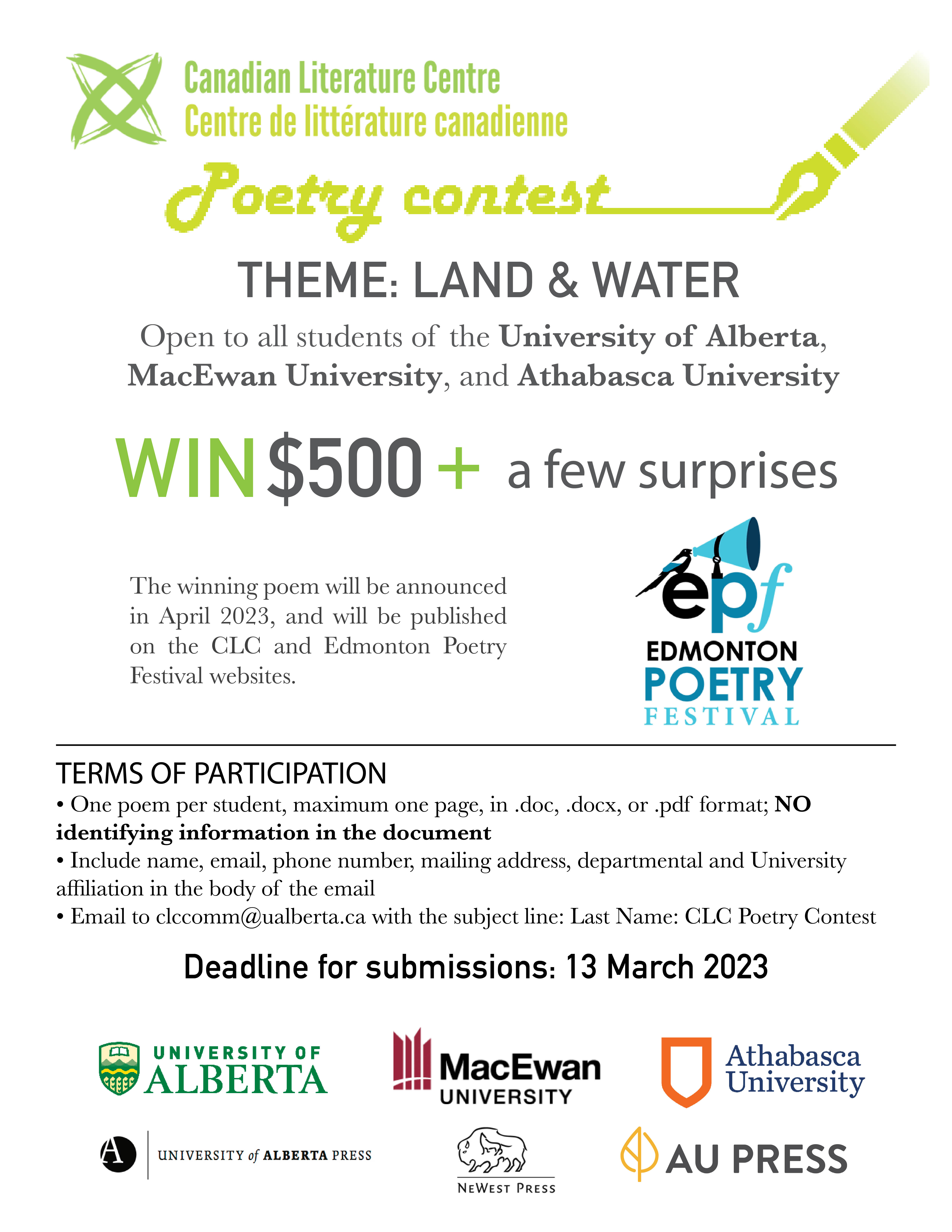
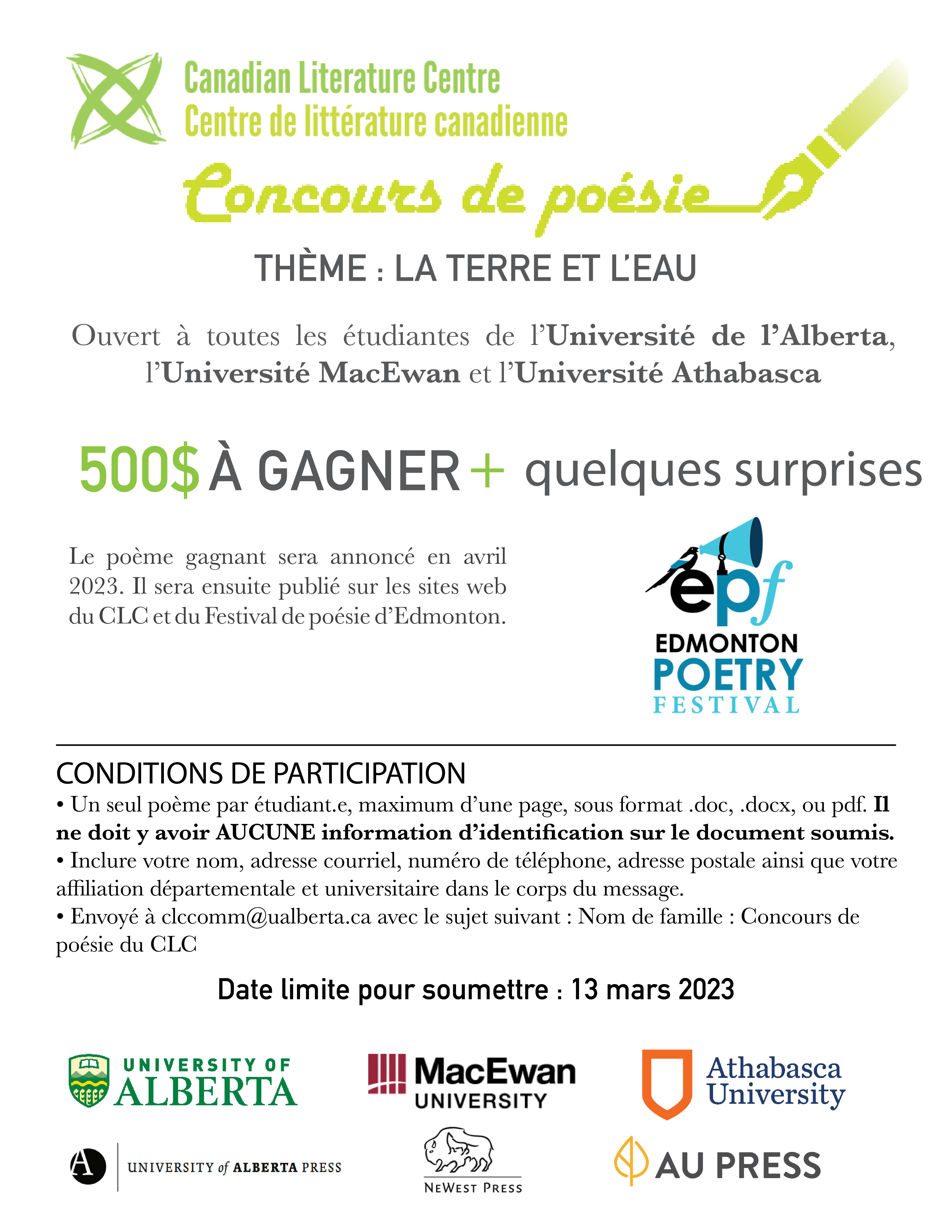
2022 CLC Poetry Contest Winner
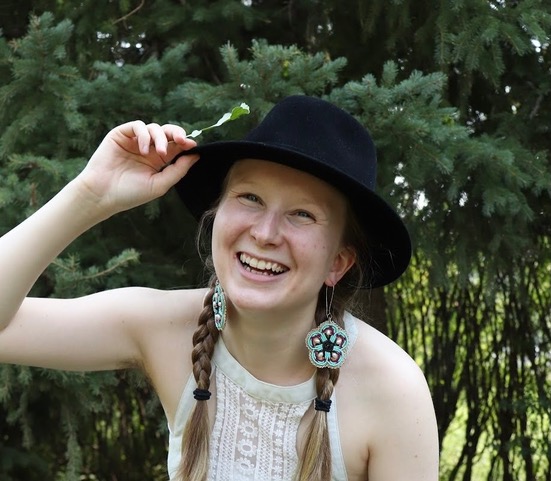
The CLC, MacEwan, and Athabasca University extend our heartfelt congratulations to Meghan Eaker, whose poem “nitohtamok êkwa wiya manâpekiswek” was selected as the winner of the 2022 CLC Poetry Contest!
Meghan Eaker (she/her) is an amiskwaciywâskahikan-based poet, registered nurse, and beading artist of mixed european and nehiyaw ancestry and is a member of the Woodland Cree First Nation in treaty 8 territory. She is currently pursuing a PhD at the University of Alberta studying storysharing as a practice towards miyo pimatisiwin (a good life).
Read the winning poem below and listen to Meghan give a reading!
The contest judges, Professors Marla Epp (MacEwan), Jocelyne Le Ber (Athabasca), and Michael O'Driscoll (University of Alberta) wrote: “This is a beautifully constructed poem that is at once economical, powerful, and compelling. The poem's precise and evocative verse focuses on listening as an intergenerational experience that produces a collective triumph of song and poetry, expressed through metaphors of musical collaboration and the author's humble contribution as a 'magpie voice.' The Cree title and speaker's address to 'nimosompan,' or grandfather, contributes to the poem's inspiring assertion of voice and community.”
Congratulations also to Mikayla Bortscher, whose poem "CPR for a Heterotroph" received an honourable mention.
The judges commented: "This poem offers the reader a wonderful process of discovery, as the sensuous details of the scene gradually come into focus with a synaesthetic richness that merges colour and sound, mimicking the gradual convergence of human and natural time and experience. The striking colours of the poem--synthetic red lipstick and chlorophyll green--sound as much as they show this encounter that demonstrates a profound attunement to the non-human world. Formally, the poem's rhythm, internal rhymes, and visual prosody are evidence of an accomplished poetic that accentuates the poem's evocative imagery."
Thank you to all who submitted to the contest this year, as well as to our partners: MacEwan, Athabasca University, Edmonton Poetry Festival, University of Alberta Press, NeWest Press, & Athabasca University Press.
nitohtamok êkwa wiya manâpekiswek
on his deathbed
nimosompan asked me
do you understand?
i’m not sure, i replied
but i have been listening
when i will have need of these teachings
i know the memory of your voice
will come to me
then, i will understand
when the teachings i was not yet ready
to follow become inscribed
in my bones by the hand
of experience
then, i will know
listen to my magpie voice
can you hear the layered harmonies?
when i speak
i do not speak alone
my voice is a chorus of many generations
i cannot take credit
for this poetry alone
it is not mine
it belongs to all the echoing
voices past, present, and future
that sing it into being
translations:
nitohtamok êkwa wiya manâpekiswek – listen, then speak with care
nimosompan – my late grandfather/great-uncle
2022 CLC Poetry Contest: "Listening/écoute"
The Canadian Literature Centre, MacEwan University, and Athabasca University are once again teaming up to bring you the 2022 CLC Poetry Contest! We’re looking for the best poem in English or in French from a University of Alberta, MacEwan University, or Athabasca University student on the theme of “Listening.”
Entrants should submit their poem in .doc, .docx, or .pdf format, without any identifying information in the document, to clccomm@ualberta.ca by March 14, 2022. Please include name, email address, phone number, mailing address, departmental and university affiliation in the body of the email, and use the subject line: “Last Name: CLC Poetry Contest."
Le Centre de littérature canadienne de l’Université de l’Alberta (CLC), en collaboration avec l’Université MacEwan et l’Université Athabasca, vous invite à participer à son Concours de poésie 2022. Nous sommes à la recherche du meilleur poème en français ou en anglais écrit par un étudiant ou une étudiante de l’une des trois institutions, qui porte sur le thème "Écouter."
Chaque participant devra soumettre leur poème dans un seul fichier anonymisé de format .doc, .docx ou .pdf et l’envoyer à clccomm@ualberta.ca au plus tard le 14 mars 2022. Veuillez inclure votre nom, courriel, numéro de téléphone, adresse postale et affiliation départementale ou universitaire dans votre courriel, puis utilisez la formule suivante dans le sujet du message : “VOTRE NOM DE FAMILLE: Concours de poésie du CLC”.
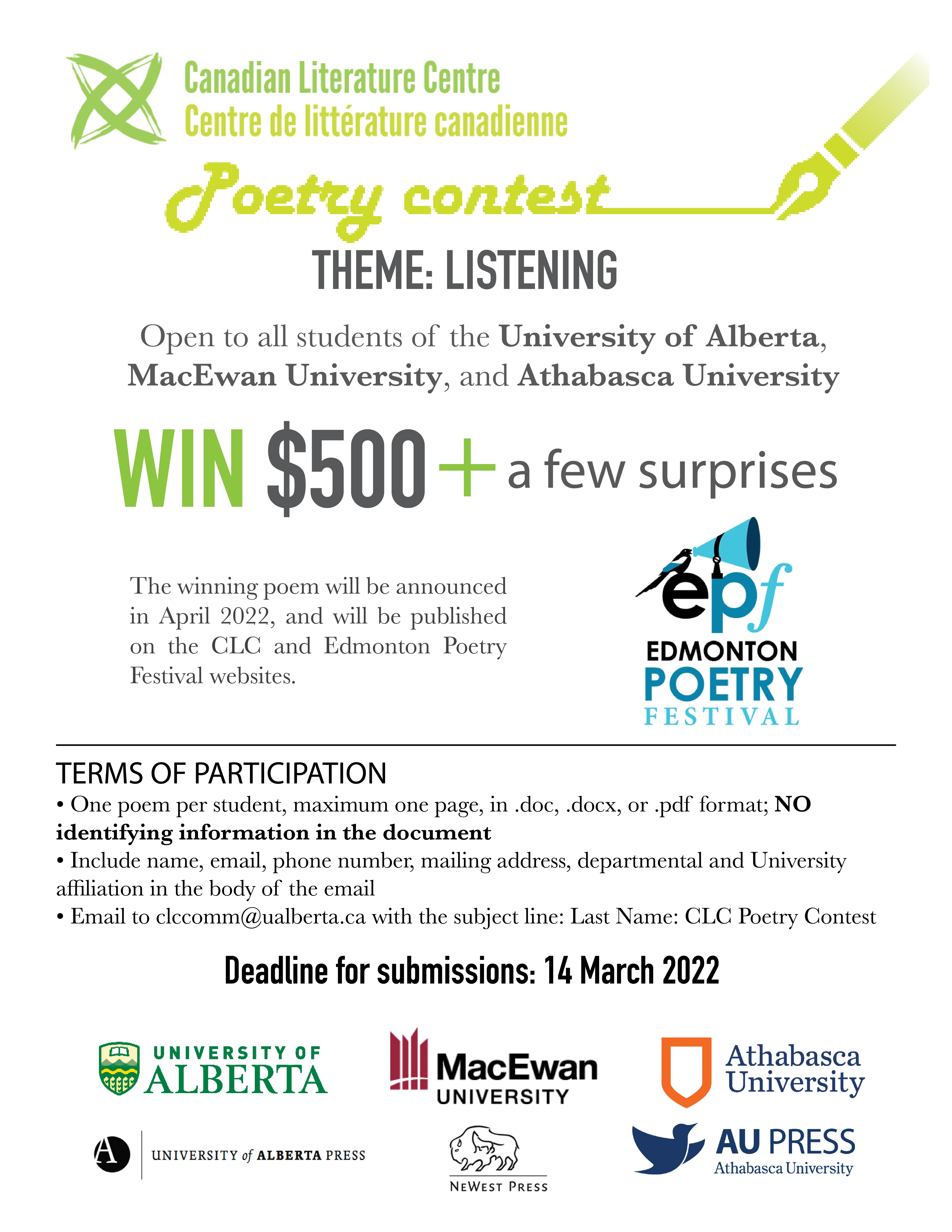
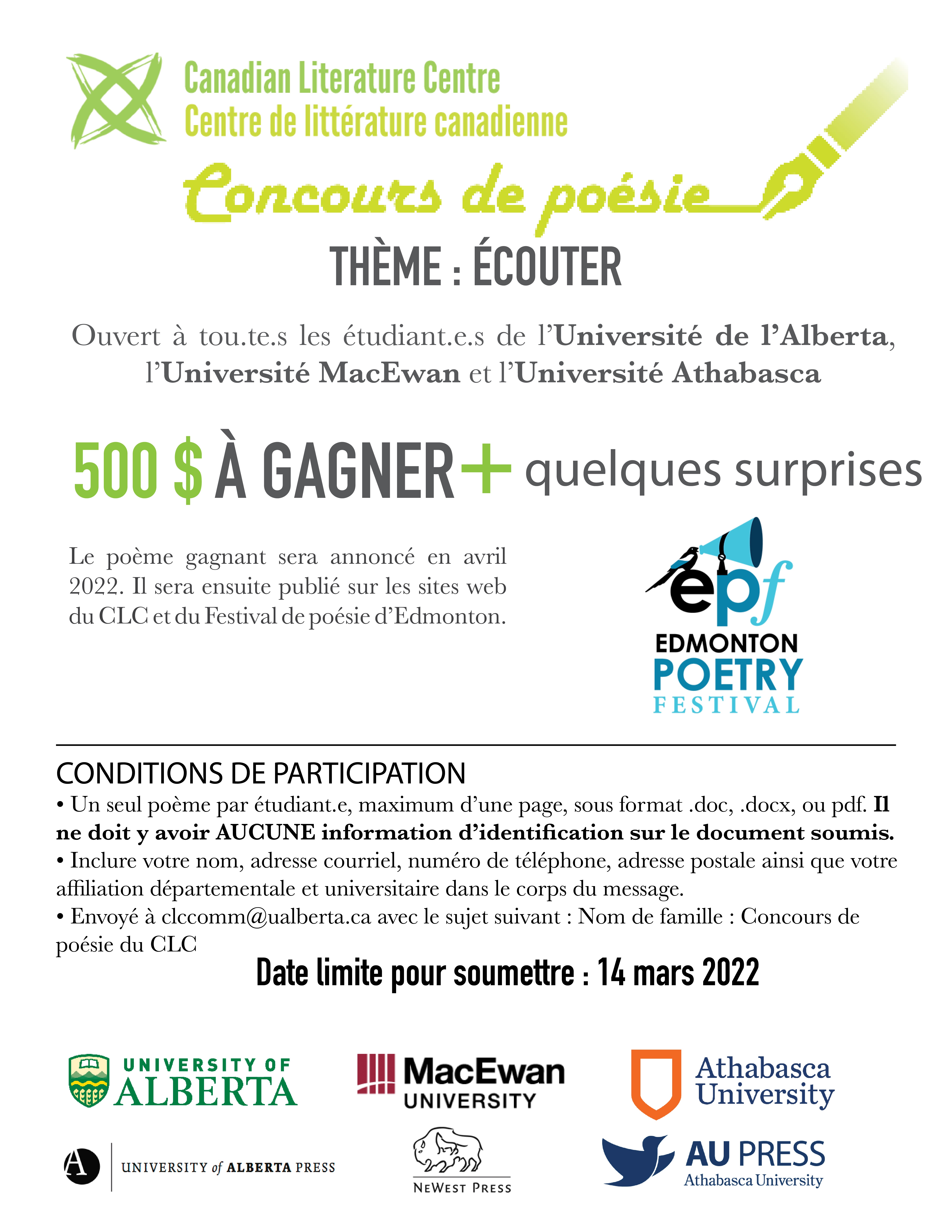
2021 CLC Poetry Contest Winner
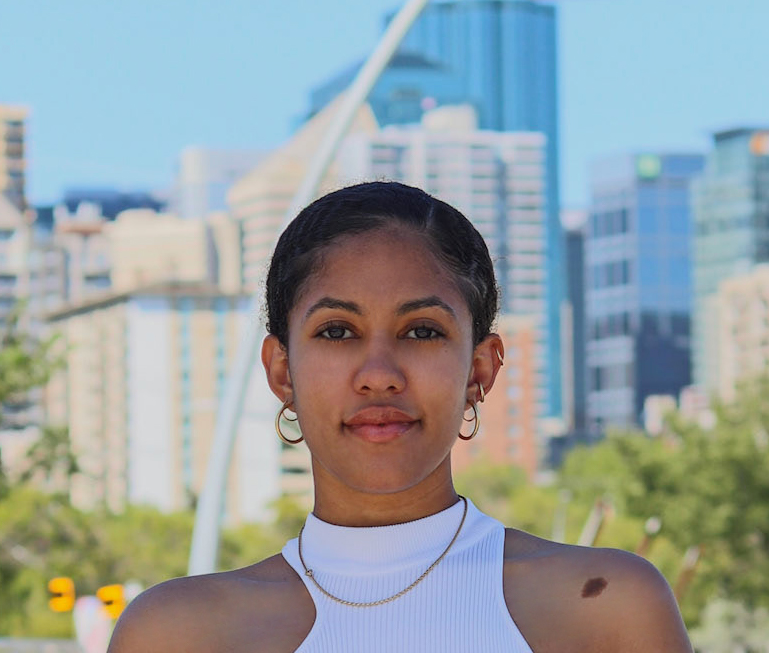
Congratulations Céline Caruso Dixon, whose poem "When Honey Drips" was chosen as the winner of the 2021 CLC Student Poetry Contest!
The contest judges, Professors Marla Epp (MacEwan), Evelyne Gagnon (Athabasca), and Jordan Abel (University of Alberta), praised the poem’s “strong point of view,” well-crafted rhythm and pacing, and “rich imagery.” Showing “a wide historical context entangled with more intimate moments,” this “resonant and powerful poem” “invites us to listen attentively, to open our minds and our hearts to this engaging experience of beauty and resilience.”
Read the winning poem and listen to Céline Caruso Dixon give a reading!
When Honey Drips
Let the melanin drip like honey down my body
Broad noses, Thick lips, Curly hair
Trust me when I tell you that Black beauty
That this melanin, is power
They told us you need to straighten your hair without ever recognizing that our curls
Told the paths of freedom braided into our scalps
The blood of our ancestors run through us
The melanin drips from us like honey
Let me explain to you what privilege looks like because black bodies know the word
As it rolls off our tongue and caresses our thoughts
We have never felt warmth in its presence
I foolishly screamed “SAY IT LOUDER FOR THE PEOPLE IN THE BACK”
My mistake, you see we have always been told to get to the back they have taken over the front seat
I do not need to say it to the people who already understand what it means.
And our melanin drips a little darker, now mingled with red
You see our beauty is defined with in our pain I’m sure you see the trends
The box brains, the long nails, The hoops, The use of vernacular
I’m sure you see the similarities between us and these trends
Our beauty wasn’t meant to be commodified, our beauty, our culture, our presence
Let me tell you the joys of being Black
One: Our food is made through loving hands, coloured with spices of distant lands some turned into our home
Two: Our hair. A symbol of beauty. My Afro puff, bantu knots, cornrows, wraps, weaves, wigs and more my hair is not a symbol for you to touch. I don’t know where your hands have been anyways
Three: Vernacular. We speak in a way that symbolizes our history. Our ability to code switch has nothing to do with us and everything to do with you.
Four: Thick lips came naturally for us we speak with power and love even harder, we were conditioned to look at them as a Nuisance as we watch lip fillers become popular
Five: Our culture. Broad and wide we have adapted to create culture where ever we are. We are from the world. African, Caribbean, African American, Afro Latin our culture although diverse showcases the beauty we have.
And our melanin drips as if it was glowing
Trust me when I tell you that black beauty that our melanin is powerful
Black hymns run through us and formulate jazz blues rock and roll rap rhythm and blues
Our voices despite being pushed down have thrived and only become louder
And our melanin drips for longer
When I tell you our beauty has come from pain
Take a look at our history
You don’t need to go that far
Last summer was another showcasing of our blackness becoming pain
We stand with them
George Floyd, Breonna Taylor, Ahmed Aubrey
And the thousands of others
If cameras weren’t around would you believe us
And our melanin drips tingling off our finger tips
Like honey it is sweet to the taste
It has history, it has culture, it is beauty
When I tell you our Blackness is beautiful
I don’t say it to reassure myself because of our history
I say it because Blackness is the embodiment of beauty
And we will forever let our melanin drip like dark honey from our fingertips.
2021 CLC Poetry Contest: "Reckoning and resilience/responsabilité et résilience"
The Canadian Literature Centre, MacEwan University, and Athabasca University are teaming up to bring you the 2021 CLC Poetry Contest! We’re looking for the best poem in English or in French from a University of Alberta, MacEwan University, or Athabasca University student on the theme “reckoning and resilience.”
Entrants should submit their poem in .doc, .docx, or .pdf format, without any identifying information in the document, to clccomm@ualberta.ca by March 15, 2021. Please include name, email address, phone number, mailing address, departmental and university affiliation in the body of the email, and use the subject line: “Last Name: CLC Poetry Contest."
Le Centre de littérature canadienne de l’Université de l’Alberta (CLC), en collaboration avec l’Université MacEwan et l’Université Athabasca, vous invite à participer à son Concours de poésie 2021. Nous sommes à la recherche du meilleur poème en français ou en anglais écrit par un étudiant ou une étudiante de l’une des trois institutions, qui porte sur le thème "responsabilité et résilience."
Chaque participant devra soumettre leur poème dans un seul fichier anonymisé de format .doc, .docx ou .pdf et l’envoyer à clccomm@ualberta.ca au plus tard le 15 mars 2021. Veuillez inclure votre nom, courriel, numéro de téléphone, adresse postale et affiliation départementale ou universitaire dans votre courriel, puis utilisez la formule suivante dans le sujet du message : “VOTRE NOM DE FAMILLE: Concours de poésie du CLC”.
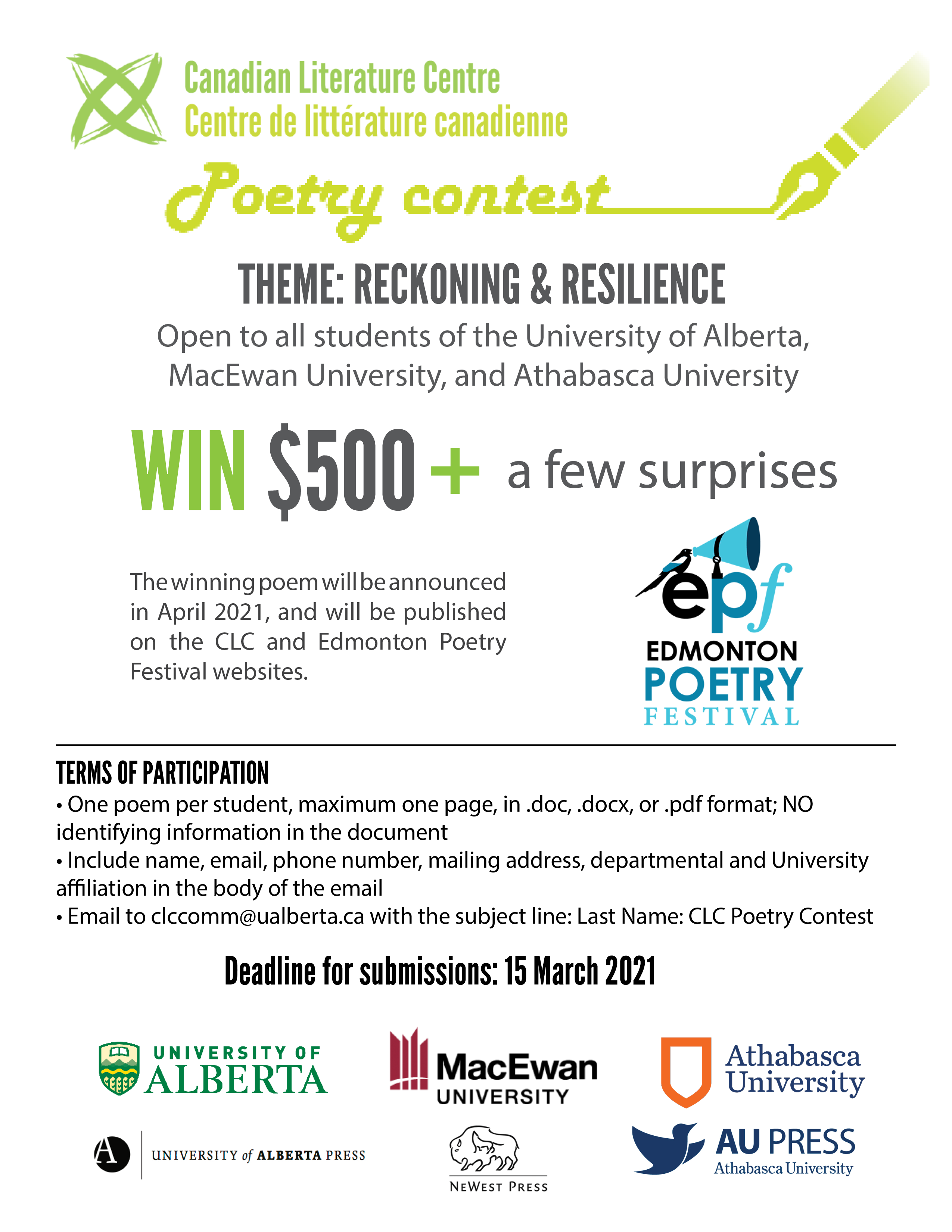
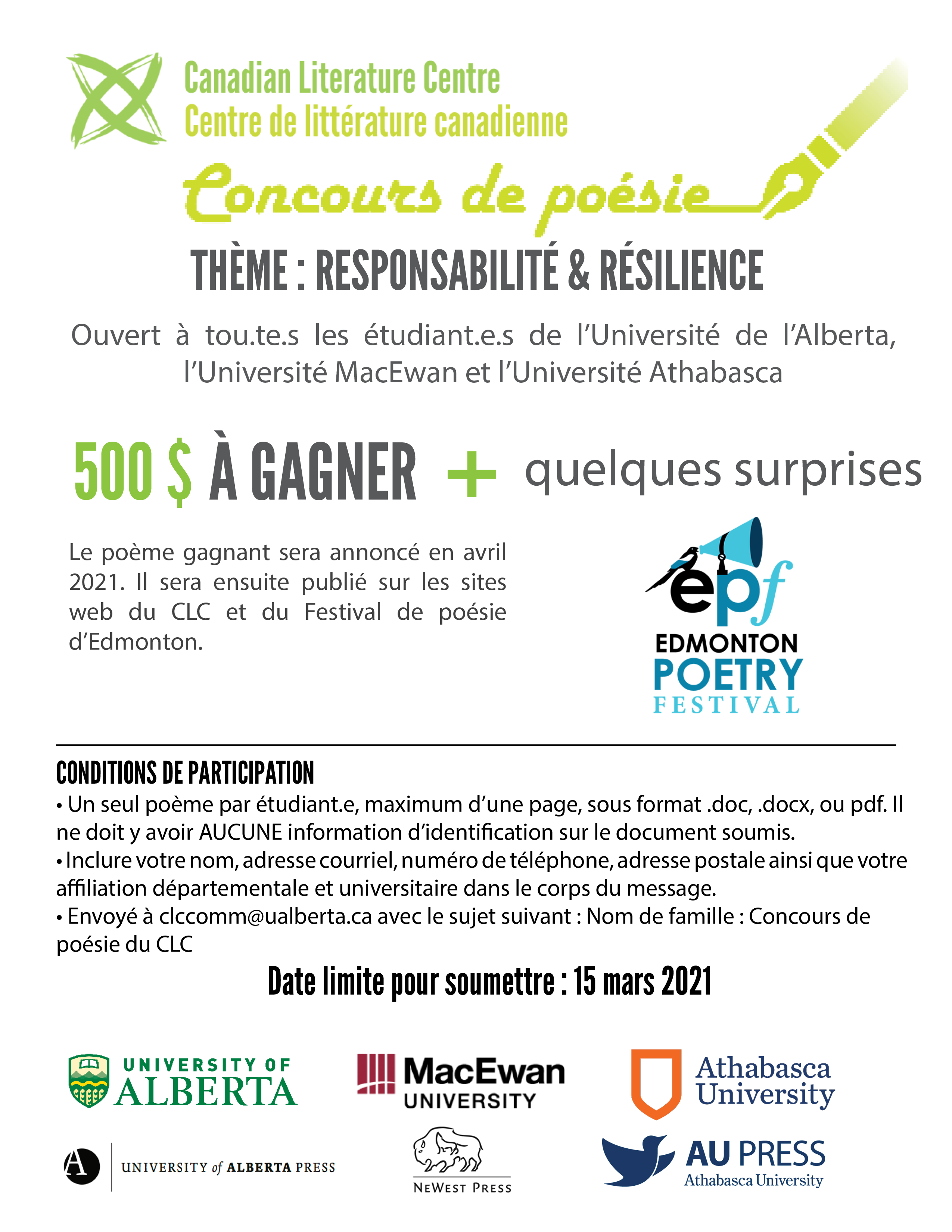
2020 CLC Poetry Contest Winner
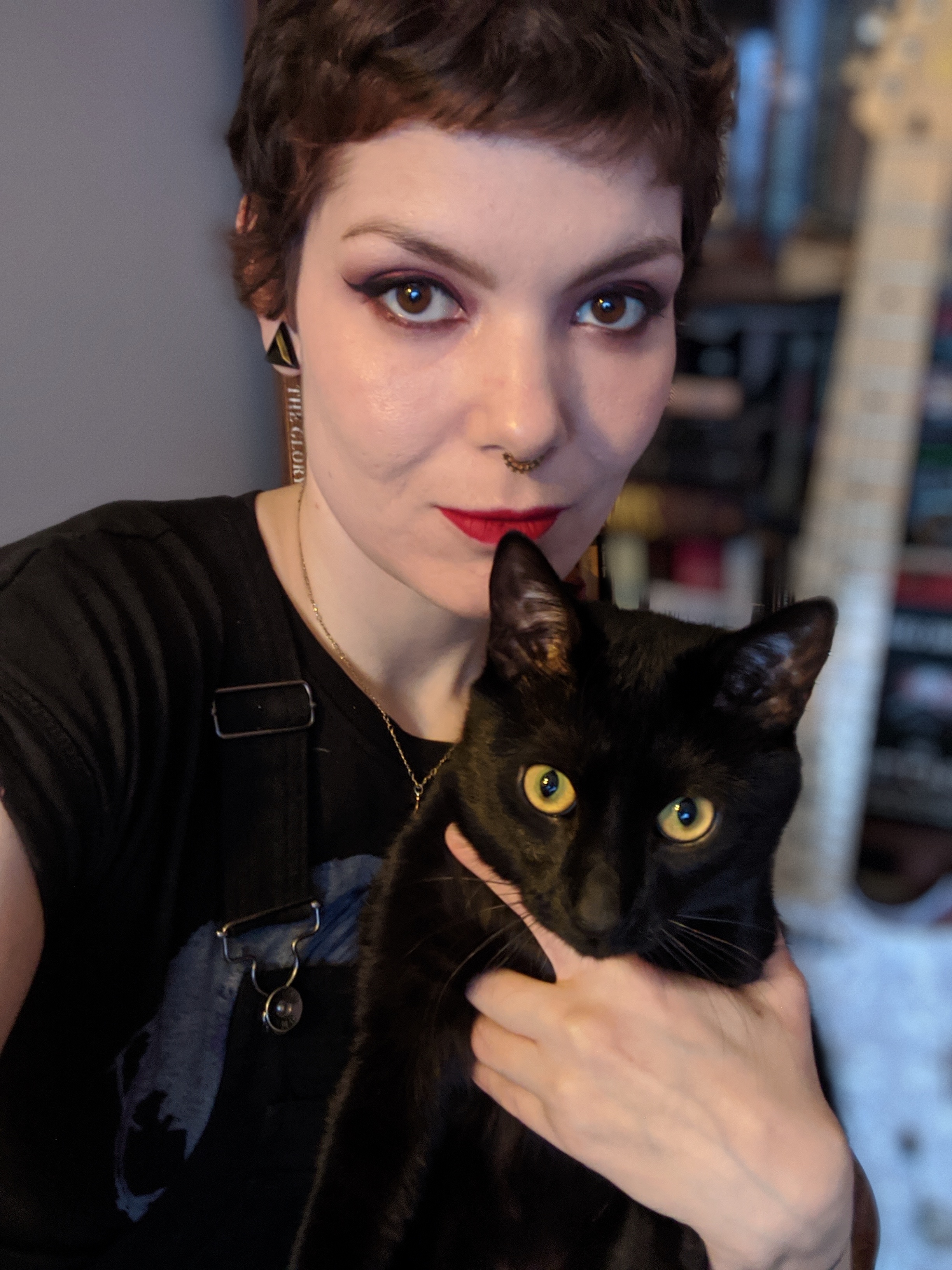
Congratulations Skye Haggerty, whose poem "paper tree" was chosen as the winner of the 2020 CLC Poetry Contest!
Skye Haggerty is a Métis writer from the bush, North of Amiskwaciywaskahikan. As the granddaughter of a traditional artisan, her childhood was spent dabbling in various crafts and gathering material from nature. Despite relocating to the city, not much has changed in this regard and her various pursuits seem to always find her wandering the muskeg of memory.
Listen to Skye reading "paper tree"!
2020 CLC Poetry Contest: "Literary ecologies/écologies littéraires"
The Canadian Literature Centre, MacEwan University, and Athabasca University are teaming up to bring you the 2020 CLC Poetry Contest! We’re looking for the best poem in English or in French from a University of Alberta, MacEwan University, or Athabasca University student on the theme “Literary Ecologies.”
Entrants should submit their poem in .doc, .docx, or .pdf format, without any identifying information in the document, to clccomm@ualberta.ca by March 13, 2020. Please include name, email address, phone number, mailing address, departmental and university affiliation in the body of the email, and use the subject line: “Last Name: CLC Poetry Contest."
Le Centre de littérature canadienne de l’Université de l’Alberta (CLC), en collaboration avec l’Université MacEwan et l’Université Athabasca, vous invitent à participer à son Concours de poésie 2020. Nous sommes à la recherche du meilleure poème en français ou en anglais écrit par un étudiant ou une étudiante de l’une des trois institutions sur le thème “Écologies littéraires.”
Les participant.e.s doivent soumettre leur poème dans un seul fichier anonymisé de format .doc, .docx ou .pdf et l’envoyer à clccomm@ualberta.ca au plus tard le vendredi 13 mars 2020. Veuillez inclure votre nom, courriel, numéro de téléphone, adresse postale et affiliation départementale ou universitaire dans votre courriel, puis utilisez la formule suivante dans le sujet du message : “VOTRE NOM DE FAMILLE: Concours de poésie du CLC”.
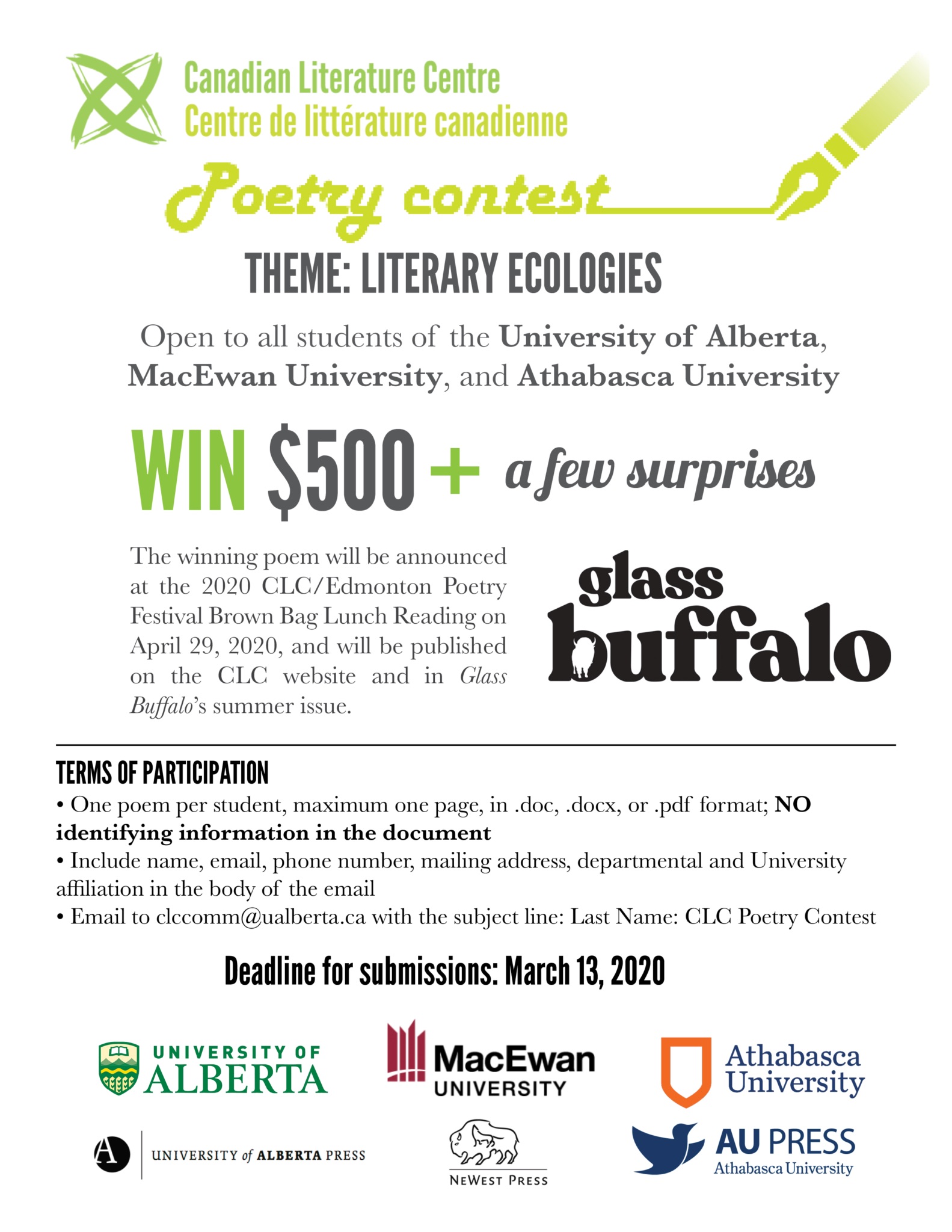
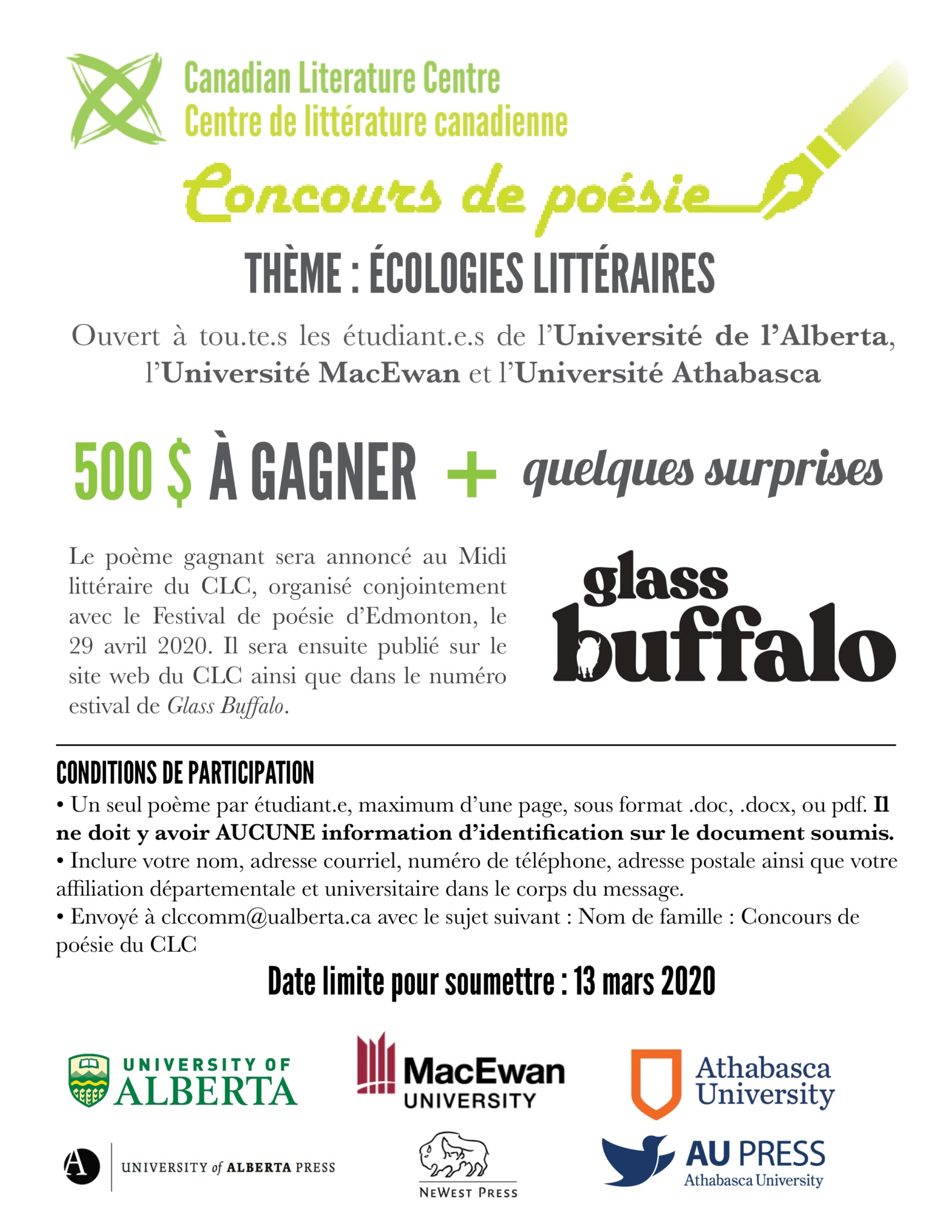
2019 CLC Poetry Contest: "Re/Placing Language/re/placer le langage"
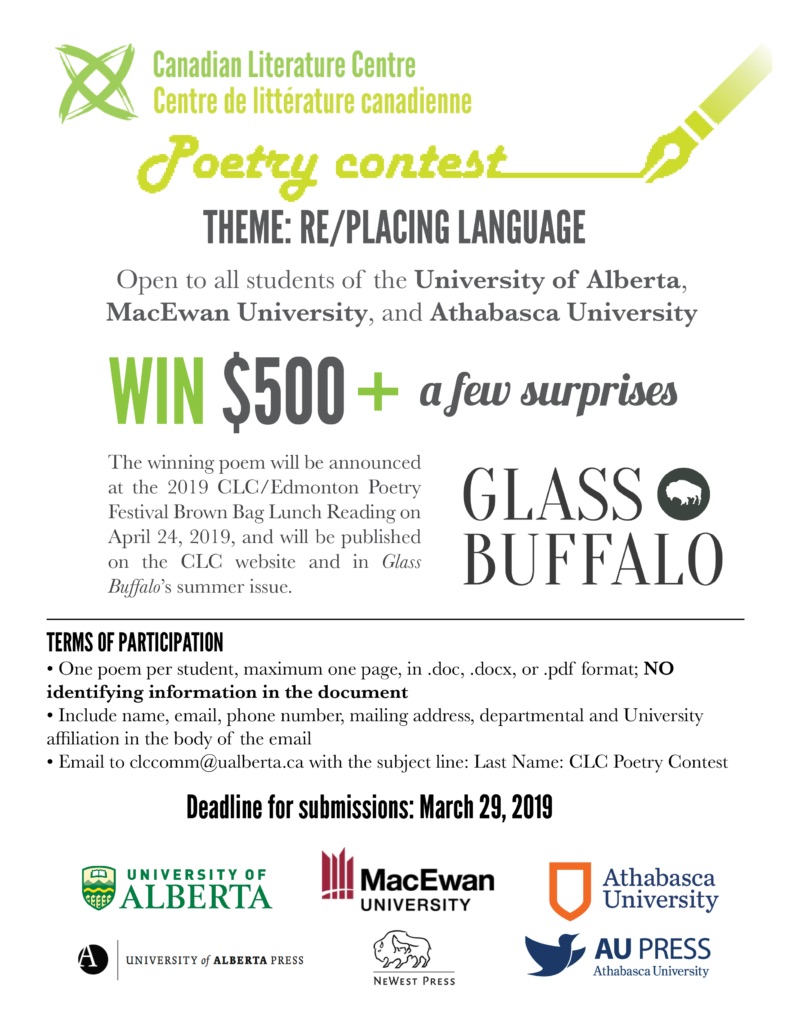
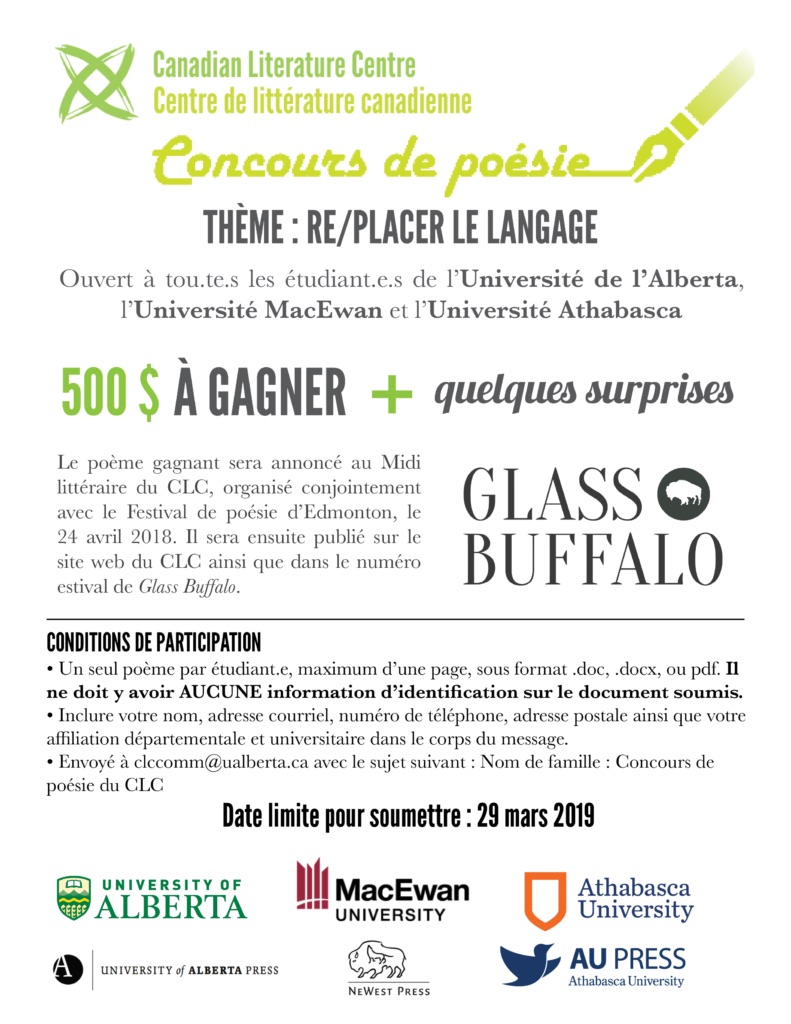
2018 CLC Poetry Contest: "Transactions and Exchange Values/transactions et valeurs d'échange"
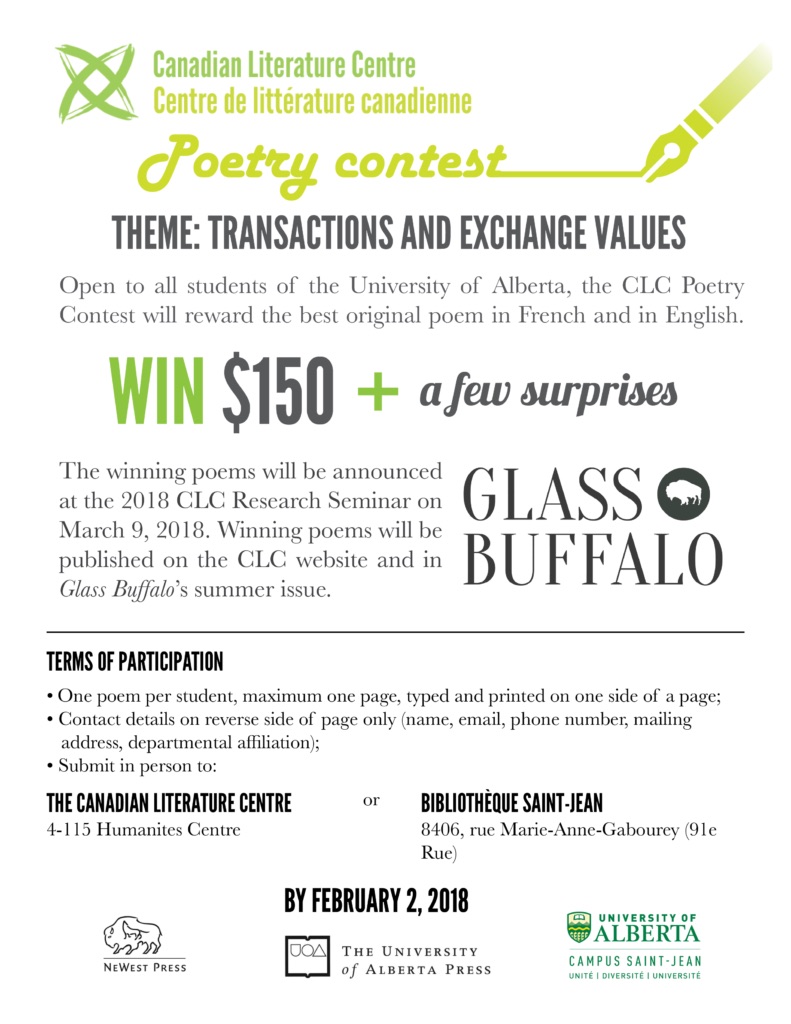
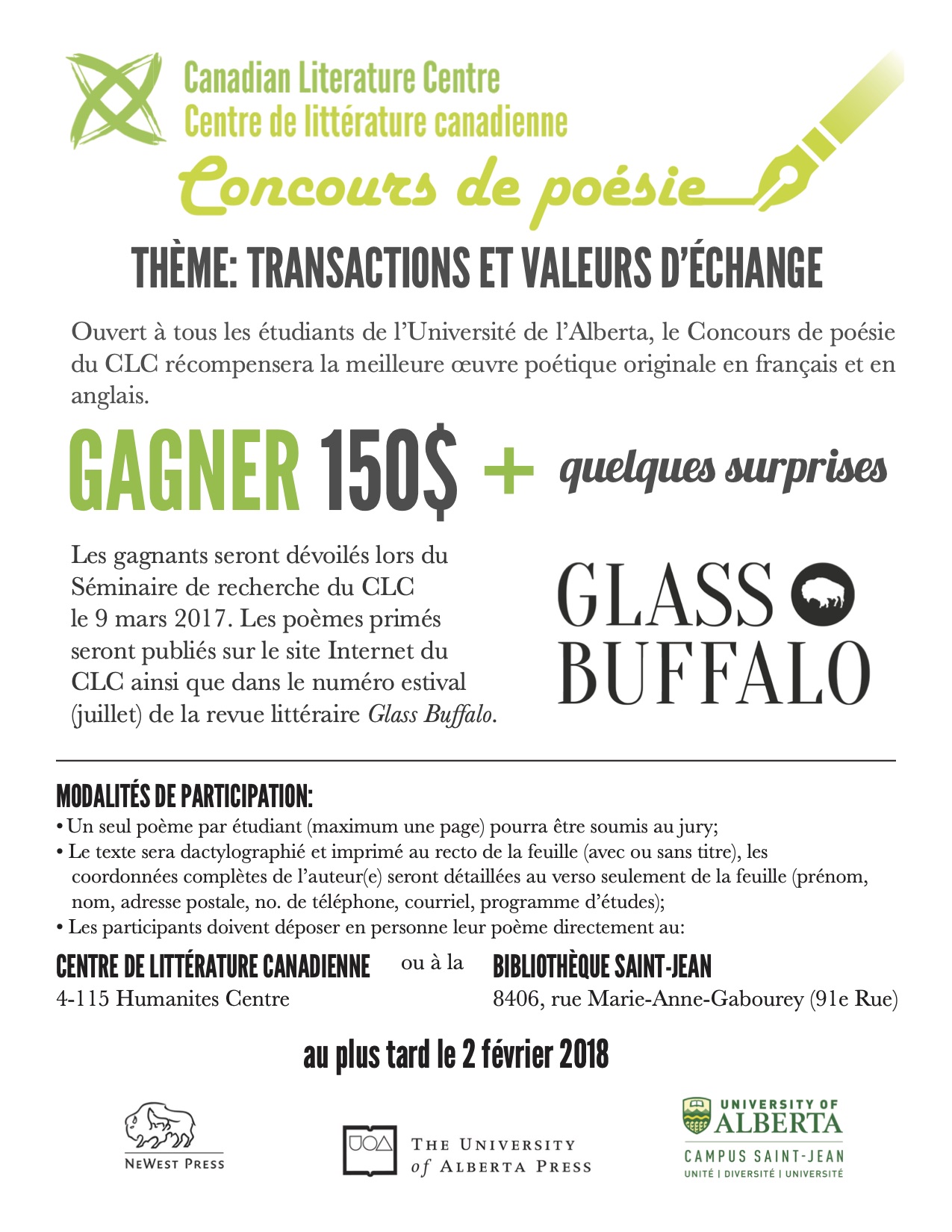
2017 CLC Poetry Contest: "The Ordinary and the Everyday/l'ordinaire et le quotidien"
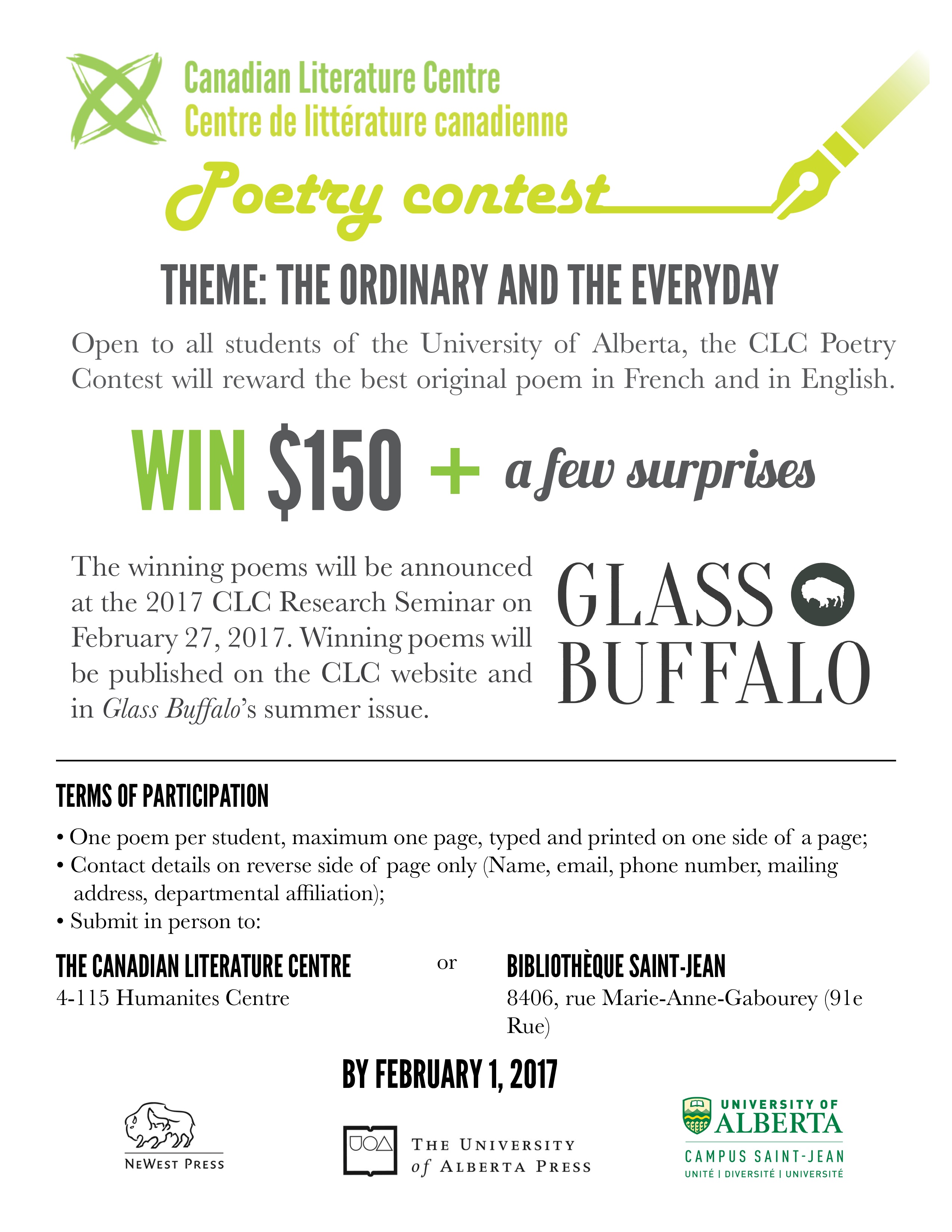
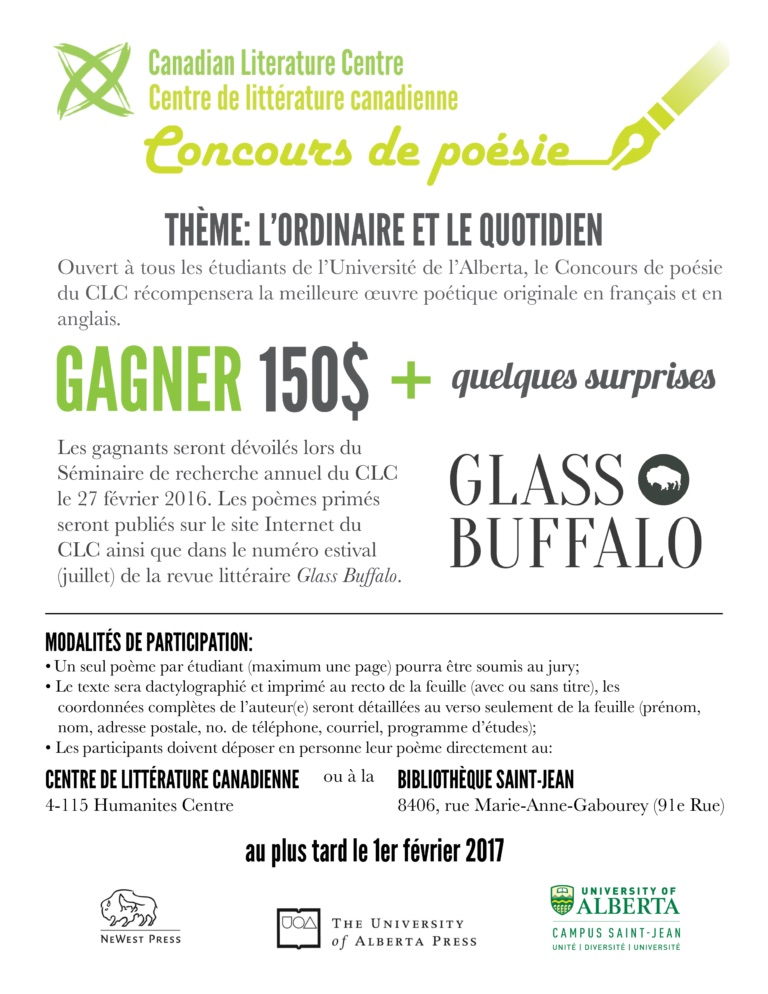
2016 CLC Poetry Contest: "Conversation"
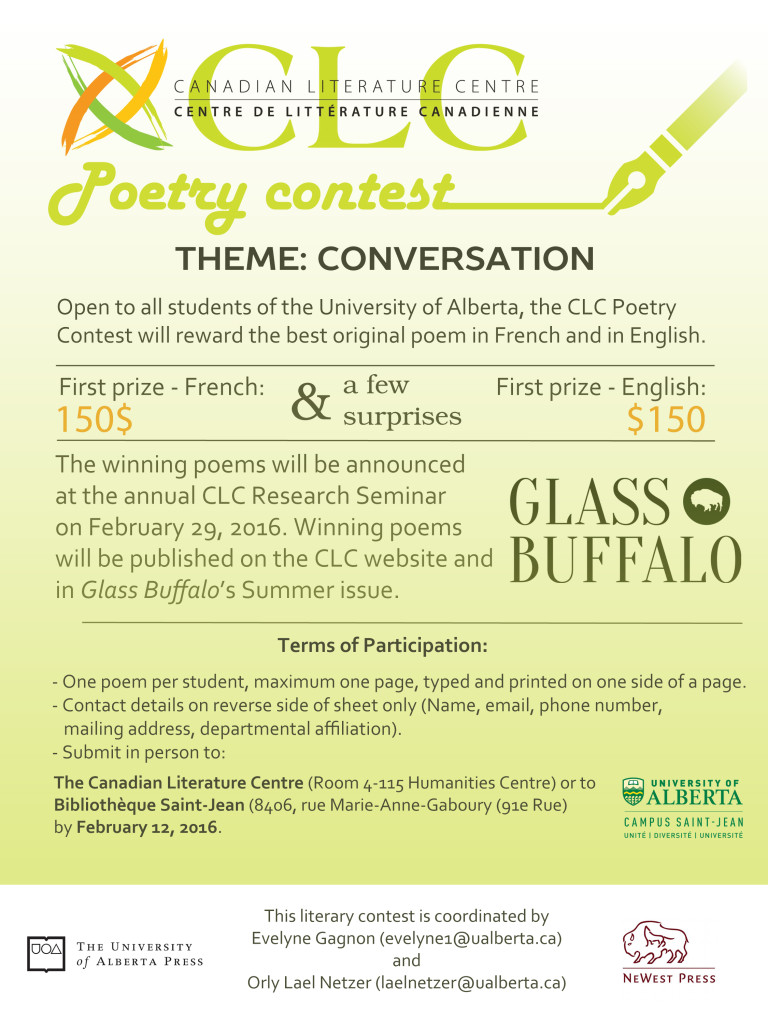
2015 CLC Poetry Contest: "Emergence and Renewal/émergence et renouveau"
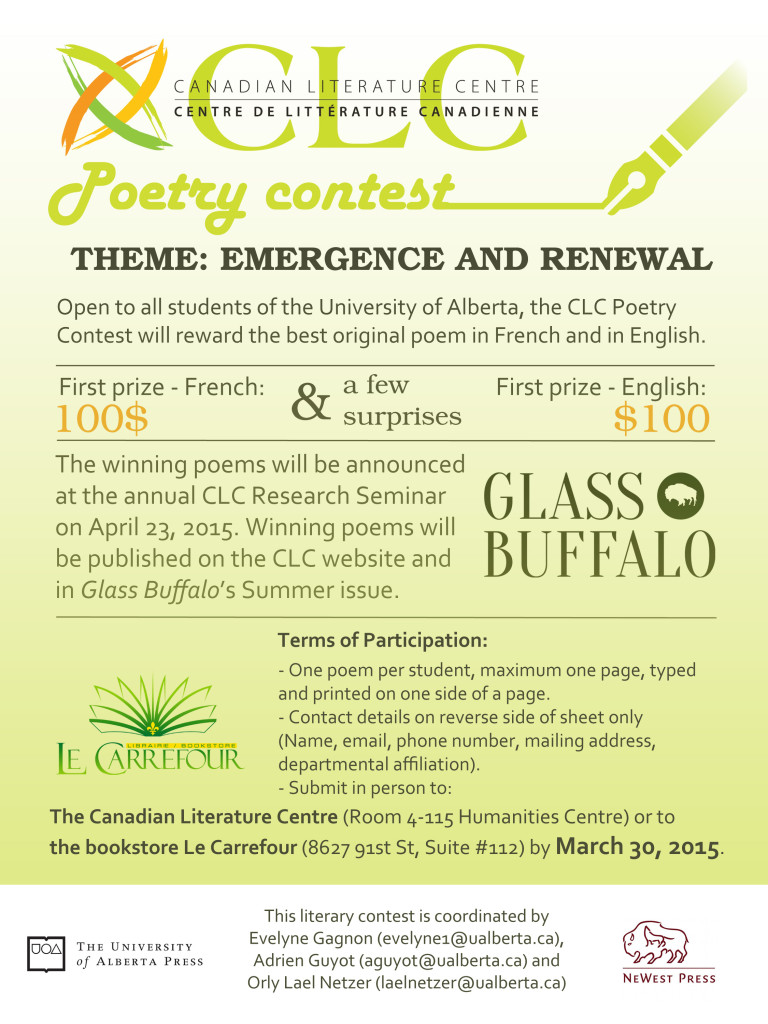
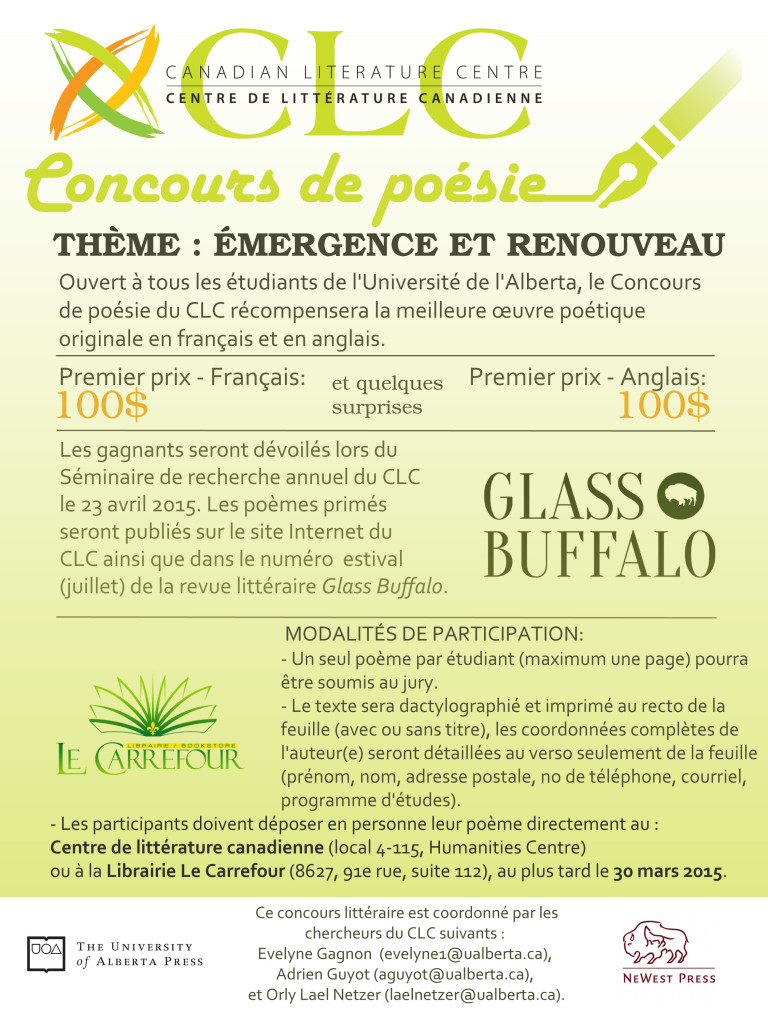
2014 CLC Poetry Contest: "The 21st Century"
